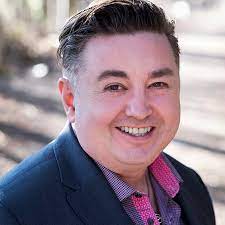
“Someone asked me once how I lost my humanity. I didn’t lose it; I traded it for acceptance and approval until there was nothing left.”
Tony McAleer, featured speaker at our April 3, 2022, L.E.D. (Learn. Explore. Discuss) program has a remarkable story of personal transformation. He was a former skinhead recruiter and organizer for the White Aryan Resistance, manager of a racist rock band, ardent anti-Semite and gay basher, a skillful propagandist, and designer of some of the first white supremacist websites. All in all, he seemed unlikely to become an inspirational leader for compassion and forgiveness.
Tony described his journey in fascinating detail, explaining why he became a white supremacist and what ultimately changed him. “I didn’t come into the world a neo-Nazi. I grew up in an affluent neighborhood and my father was a psychiatrist. When I was ten, I walked into his room and saw my Dad with another woman. That shattered my world and my trust in authority figures. It was all downhill after that—changing schools, being bullied, and then befriended by skinheads. I felt safe with them; I felt powerful and it was intoxicating. It wasn’t the ideology that drew me in. I got attention when I felt invisible; I found acceptance when I felt unlovable. I felt a sense of identity, belonging, and purpose.”
What changed that and started Tony down the road to becoming a “former”? “It began in a hospital delivery room being with my newborn daughter and connecting with a human being again. My son was born a few years later, and I allowed my heart to thaw. Becoming a single father gave me the opportunity to change. The problem was that white supremacy wasn’t just what I believed…it was who I was: my friends, the videos I watched, the music I listened to. If you try to change someone who’s down the rabbit hole with facts and logic, it won’t get you anywhere. You have to change people in my kind of situation through the heart, not the head, and through compassion, making sure it comes with healthy boundaries and understanding consequences. If toxic shame—the belief that you are a bad person—is the cause of extreme racism, the answer is connecting people back to their humanity and compassion is the tool.”
“As a single father, I needed my mother to help raise my kids. Her leverage was getting me to leave the movement, which I did in 1998, after 15 years of involvement and leadership. This process is called disengagement—when you leave groups and social circles behind but still have their beliefs intact. Disengagement is just a first step. I still believed that I was doing something for the white race by raising two white children. White supremacy became less and less important, but the hardest part was leaving these groups behind. When you join them, you excommunicate yourself from family, friends, and society. They are not waiting for you with open arms when you leave the extremist groups. You have to win their trust back. I had to prove I wasn’t the same person. Until that happens, you are in a void—a very lonely place and one where you are at the greatest risk of going back.”
“The hardest thing for me was to have compassion for myself after all the ugly things I did. I found compassion from a counselor in personal development who became my mentor. He saw the humanity in me and helped to heal wounds that had influenced my dark choices.”
